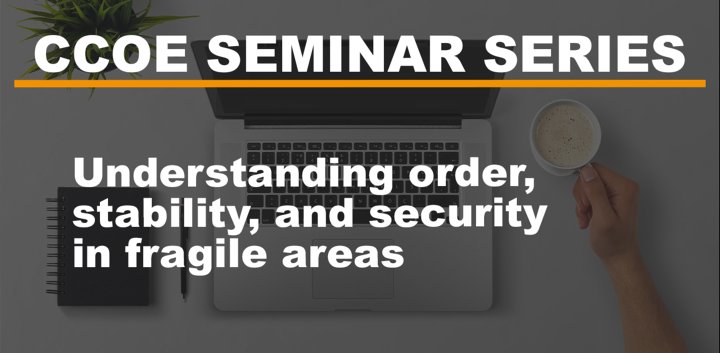Understanding order, stability, and security in fragile areas (26 NOV 2020)
Notions of order, stability, and security are frequently conflated and loaded with normative assumptions about Western ‘ideal’-types. This poor understanding frequently distorts the analysis of conflict patterns and the links between the local population, non-state armed group actors, the host nation, and international actors. Yet, if conceptualised properly, order and functional security have much potential to challenge our Western biases and to transform our understanding of patterns of violence, elite bargains, and opportunities to create more stable environments.
The two expert speakers. Dr Alice Hills, founding member of the UNDPKO's International Police Advisory Council (IPAC), UNDP civilian police expert and Visiting Professor at the University of Leeds as well as Dr James Worrall, Reviews Editor for the journal Civil Wars and Associate Professor at the University of Leeds, covered the topic of how analytical conceptualisations of order, stability and security can transform our understanding and produce a better analysis of conflict patterns and dynamics in fragile areas.
The seminar was structured by the following questions and guiding points:
- Definitions and conceptualizations of order, stability, security
- How are order, stability, and security linked with each other?
- What do they look like in fragile areas? A Somalian Case Study
- How do orthodox ideas about order and security shape our understanding?
- How can we analyse and explain patterns of order, stability, and security in (post-)conflict areas?
- How can this view transform our understanding and produce better analysis?
Feel invited to find out more about the seminar and the ideas conveyed in it by checking out the content below.
If you are interested in further information regarding the CCOE Seminar Series in general we would recommend you to have a look at the overview.
Dr Alice Hills
Professor Alice Hills holds a doctorate in war studies from the University of London and her publications include books on 'Policing Africa: Internal security and the limits of liberalization' (Lynne Rienner), 'Future war in cities: Rethinking a liberal dilemma' (Cass), 'Policing post-conflict cities' (Zed) and 'Making Mogadishu safe: Localisation, policing and sustainable security' (Taylor & Francis). Her expertise is internationally recognised by decision-makers, most notably by Jean-Marie Guéhenno, who in 2006, as under-secretary-general for UN peacekeeping operations, invited her to become a founding member of the UNDPKO's International Police Advisory Council (IPAC). In 2011, the UNDP appointed her the civilian police expert responsible for assessing the Rule of Law programme in Somalia. She states that international actors “ignore the elements of power that local elites take for granted, neglect the dynamics affecting or expressing security relationships within countries, and are reluctant to accept assessments that require them to change cherished goals such as gender equality” (Hills 2014, p.165). Alice is Visiting Professor at the University of Leeds and holds an honorary fellowship at Durham University.
- Hills, A. 2014. Security Sector or Security Arena? The Evidence from Somalia. International Peacekeeping. 21(2), pp.165-180.
- Hills, A. (2011). Policing Africa: Internal security and the limits of liberalization. International Review of Law, Computers & Technology, 25(1-2), 69-77.
- Hills, A. (2004). Future war in cities: rethinking a liberal dilemma. Psychology Press.
- Hills, A. (2019). Making Mogadishu Safe: Localisation, Policing and Sustainable Security: Localisation, Policing and Sustainable Security. Routledge.
Dr James Worrall
Professor James Worrall’s research interests lie in the fields of Security Studies and International Relations and include Western relations with the Arab World, Gulf Politics, Security and Society, Regional International Organisations, Decolonisation, Counterinsurgency Strategy, Security Sector Reform, Regime Stability and Legitimacy in non-democratic states and Diplomatic Theory and Practice. He has published widely on non-state armed actors governance and frequently advises the British government and others on issues in the MENA region. He also has a strong interest in sub-state conflict and is the Editor of the academic journal Civil Wars. He states that “bringing order back into our understanding of rebel and insurgent groups has much to offer in exploring the everyday politics which connect authorities, rebel movements and the population itself, in a complex mass of intersubjective and power-based interactions and negotiations” (Worrall, 2017, p.709). James is an Associate Professor of International Relations and Middle East Studies in the School of Politics and International Studies at the University of Leeds.
- Worrall, J. 2017. (Re-)emergent orders: understanding the negotiation(s) of rebel governance. Small Wars & Insurgencies. 28(4-5), pp.709-733.
- Civil Wars Journal

